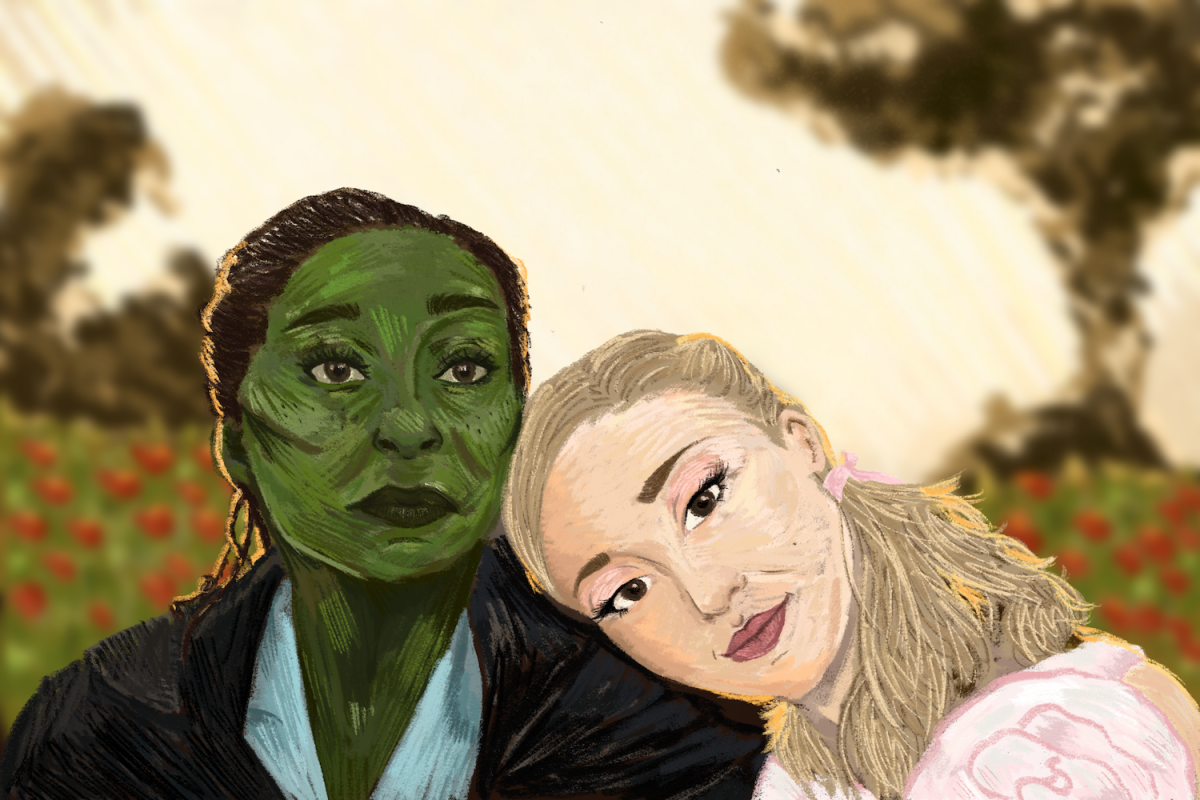I was — and still am — a theater kid. So much so that when I was young, I begged my parents to take me to New York City from Washington state to bask in the lights of Broadway. When they so graciously fulfilled that dream, the first Broadway show I saw was “Wicked The Musical.” Let’s just say, it was love at first scene.
So imagine how excited yet skeptical I, alongside other theater lovers, was when Universal Pictures announced a film adaptation of the witchy musical. The film has big shoes to fill as an adaptation of the fourth-longest-running Broadway show of all time, which received 10 Tony nominations in a single year. Both of the show’s original leading women — theater icons Idina Menzel (Elphaba) and Kristin Chenoweth (Glinda) — received nominations for best actress in a musical.
The film adaptation uses a similar formula, with two powerhouses — Cynthia Erivo and Ariana Grande — leading the star-studded cast, complete with “Bridgerton” actor Jonathan Bailey (Fiyero), Oscar-winner Michelle Yeoh (Madame Morrible) and Broadway actor Ethan Slater (Boq). However, even with a strong cast and even stronger source material, there was immense room for failure. Thankfully though, the film exceeds — or should I say defies — expectations.
“Wicked” consists only of the musical’s first act, which follows Elphaba’s journey to becoming the Wicked Witch of the West. The film takes viewers through Elphaba’s time at Shiz University, where she is ostracized and bullied for her green skin. There, she meets her roommate, the sweet and bubbly Glinda, and they immediately despise each other. However, the women end up forming a beautiful, complex friendship. During her time at Shiz, Elphaba learns to harness her magical powers with the well-respected Madame Morrible and is ultimately invited to meet the Wizard of Oz — something she has dreamed of since birth. The visit does not go as planned, however, and the movie ends on a cliff hanger, leaving audiences eager for the forthcoming “Wicked: Part Two,” which will contain the second act of the Broadway musical.
Erivo is truly the heart and soul of the film, as she successfully communicates the emotional pain that lies beneath Elphaba’s tough exterior. The witch represents anyone who has felt othered, as Erivo’s performance reminds viewers that Elphaba is not only different because of her green complexion, but also because of her pure heart. This shines through in Elphaba’s relationship with Dr. Dillamond (Peter Dinklage), a professor at Shiz who happens to be a goat.
Dr. Dillamond warns his class that animals, which are meant to be equal members of this society, are being silenced by the government. Elphaba is the only one who seems to care, befriending Dr. Dillamond and later asking the Wizard of Oz to protect animal rights. Although it is a fantastical friendship between a green girl and a talking goat, their relationship reinforces the importance of solidarity between marginalized groups — a theme incredibly relevant today.
If Erivo is the heart and soul of the film, Grande is the comedic center. Tapping into her theater roots, Grande does justice to the bubbly and goofy, good-witch Glinda. She delivers Glinda’s iconic hair toss with ease and has a fantastic dynamic with her doting henchmen — Pfannee (Bowen Yang) and ShenShen (Bronwyn James).
At some moments, Grande’s portrayal makes Glinda seem like a caricature, as she swings from a chandelier and does frantic choreography during her solo song “Popular.” However, she balances these larger-than-life scenes with genuine moments.
Grande’s acting shines through when Glinda eventually befriends Elphaba at the Ozdust Ballroom. Elphaba’s peers laugh at and mock her for dancing, and Glinda overlooks their troubled relationship and joins Elphaba on the floor. Both actresses’ performances are raw and emotional, with Glinda wiping away Elphaba’s tears. Their connection in the scene explains why the actresses cry at nearly every press event — they have a true bond on and offscreen.
As a certified theater kid myself, Grande and Erivo’s acting chops exceeded all expectations — not to mention the film’s impressive musical numbers. A standout is “What Is This Feeling?,” an ensemble number where Glinda and Elphaba express their intense hatred for each other. It’s filmed as a montage, showing different scenarios including a jesting match, arguments in their shared dorm room and them feuding in the university cafeteria. This song is arguably more enjoyable than the stage version, showing how much the girls hate each other, rather than just telling the audience.
Also, to nobody’s surprise, Erivio’s performance of the famed number “Defying Gravity” is magical. Although I knew she would kill the classic ballad, nothing could have prepared me for the last few bars of the song.
When I watched the film for the first time, all I could think about was my younger self — the hours I spent singing the musical’s soundtrack with my mom, the times I watched YouTube clips of Chenoweth singing “Popular,” and, of course, the first time I saw the musical. I saw the little girl who felt othered for her niche passions and how that girl was comforted by Elphaba’s journey of self acceptance. The film is a full circle moment for theater kids everywhere — the kids who grew up feeling different and like they weren’t enough. With its stunning musical numbers, multitalented cast and beautiful heart, I can confidently say that “Wicked” will leave audiences changed for good.
Contact Annie Emans at [email protected].

























































































































































